|
|
|
| ASIEN |
| Cambodia - India - Indonesia |
 |
|
|
| Ashden Awards - "Global Green Award" |
| Ethiopia |
Gaia Association, Ethiopia - Milkyas Debebe
Clean, safe ethanol stoves for refugee homes
Summary
he humanitarian disasters which lead to mass movements of refugees can bring huge pressure on the environment of the host country. For the past 20 years, camps in eastern Ethiopia have housed thousands of refugees who fled the conflict in Somalia, with a peak population of over 600,000 people in the early 1990s.
The UNHCR and its partner NGOs provide building materials, food, water and basic non-food items, as well as welfare and education services, in the refugee camps. What has not been provided until recently is cooking fuel. Refugee women are therefore forced to go out of the camps, several times per week, to gather firewood for cooking. Such trips can last up to eight hours: not only are they exhausting, they put women in great danger, with many reports of harassment, rape and other violence. The previously well-wooded area round Kebribeyah refugee camp is now virtually bare, as a result of the long-term pressure on wood supply from so many people.
Elsewhere in Ethiopia, unwanted molasses (a by-product of the sugar cane industry) was causing pollution through being dumped in rivers. At one sugar mill this problem had been solved by constructing a plant to convert molasses to ethanol. The Government recognised the potential for using ethanol as a clean fuel for cooking, and commissioned an 850-household pilot study of the ethanol-fuelled CleanCook stove in both refugee camps and urban households. This stove, developed in Sweden for the leisure market, uses an innovative non-pressurised canister in which ethanol is adsorbed onto mineral fibre and so does not spill.
The UNHCR was enormously impressed with the enthusiasm for the stoves among refugee women. Not only did the stoves prevent wood-collection, with its associated dangers and environmental impacts, they were also much safer, quicker and more pleasant to use, in particular avoiding the risk of respiratory and eye diseases from smoke inhalation.
The Gaia Association was formed to take the stove programme forward, initially in Kebribeyah refugee camp. Here all 1,780 families (about 17,000 people) now have ethanol stoves and a ration of one litre of ethanol per day, funded jointly by the UNHCR and the Gaia Association. The programme is expanding into the other camps which are being opened as more refugees come back to Ethiopia. The first household selection and training at Teferi Ber refugee camp was recently conducted, and stoves will soon be distributed to 800 households. In addition, stoves will shortly be used in one of the Local Government housing programmes in Addis Ababa, where people can buy new two-bedroom, one-bedroom or studio flats through a loan.
The Government plans to install ethanol plants at all sugar mills, and the ethanol production would then supply over 200,000 stoves as well as other uses.
Studies have shown that a stove can replace all the 3.7 tonnes/year of largely-unsustainable fuelwood used by a household in Kebribeyah refugee camp, equivalent to about 6.2 tonnes/year of CO2 emissions. In urban areas the stoves replace a mix of wood, charcoal and kerosene, saving an average of about 3.1 tonnes/year CO2 per stove
Minor design changes were made after the pilot study, so that the stove was more suitable for use in Ethiopia. Local production of the stoves in now starting near Addis Ababa, with an initial plan for 18,000 stoves per year, and significant potential to expand.
The organisation
The Gaia Association was founded in 2005 by US-based Stokes Consulting Group. Stokes had previously run a pilot study of ethanol-fuelled cooking stoves. The Gaia Association was founded as an Ethiopian NGO to carry the successful work forward. The Association currently employs eleven staff, mostly young Ethiopian professionals. The annual turnover of the Gaia Association
is about £180,000.
Address: The Gaia Association
Bole Subcity
Wereda 17
Kebele 23
House No 20032/L
PO Box 1460 / 1250
Addis Ababa
Ethiopia
Telephone:+251-911-61 80 43
Email:milkyasd@gmail.com
Website:None
Context
The protracted conflict in Somalia has disrupted life for millions of people. Over the past 20 years, refugees have travelled west to neighbouring Ethiopia, reaching a peak of over 600,000 in the early 1990s. Many returned voluntarily when the conflict eased in 2005, but since July 2007 the worsening situation in Somalia has caused refugees to return to Ethiopia for safety. Approximately 27,000 people are now living in Kebribeyah and Teferi Ber refugee camps in eastern Ethiopia and the UNHCR plans to re-open at least two more camps.
The UNHCR works with a number of NGO partners, including the Ethiopian Administration for Refugee and Returnee Affairs (ARRA) to care for refugees. It provides basic building materials, and families in Kebribeyah fence in small compounds in which they build a group of huts. Food, and basic non-food items like cooking pots are also provided, and water is pumped from a borehole about 20 km away, although the supply is frequently disrupted. Other NGO partners are involved with education, health and welfare.
Until recently, refugee households have not been provided with cooking fuel. This has forced refugee women to go out of the camps to collect firewood, where they are in great danger of attack and rape. Over 20 years, the previously well-wooded area around Kebribeyah has become seriously deforested.
Separately the Government of Ethiopia knew that unwanted molasses (a by-product of the sugar cane industry) was causing pollution through being dumped in rivers. At one sugar mill this pollution problem had been solved by constructing a plant to convert molasses to ethanol, but markets for the ethanol were limited. The Government recognised the potential for using this ethanol as a clean fuel for cooking, and in 2003 put out a tender for a pilot study of ethanol stoves. Harry Stokes (of Stokes Consulting) and Bengt Ebbeson (inventor of the CleanCook stove) won the tender. The Swedish-designed CleanCook stove, fuelled with locally-produced ethanol was used in a pilot study of 850 households, 300 of which were in three refugee camps.
The pilot study confirmed the usefulness, safety and popularity of the stoves. Because of the UNHCR concern about deforestation and refugee welfare, the initial focus of the follow-up programme was to provide stoves and ethanol to refugee households.
Statistical Information - Ethiopia
|
Technology and use
Stoves
The CleanCook stove is modelled on the Origo stove, which was invented in 1979 by Bengt Ebbeson and developed for the European and North American leisure market. The Origo has become one of the most popular stoves for use in boats and camping, and is now manufactured by Swedish company Dometic.
The stove is designed around the innovative ethanol canister, which is patented in the EU. The cylindrical, stainless steel canister is packed with a special refractory mineral fibre which adsorbs up to 1.2 litres of ethanol on its surfaces. When the stove is lit, the ethanol evaporates and mixes with air to burn readily, allowing a maximum power of 1.5 kW per burner. Provided that the canister is not over-filled, the ethanol will not leak or spill even if the canister is knocked over. The canister does not need to be pressurised, which minimises risk of explosion. The canister is approximately 240 mm diameter and 50 mm tall, and filled via a 80 mm diameter hole in the top, which is covered by a metal mesh to prevent the fibre from coming out.
The pilot study in Ethiopia trialled two-burner Origo stoves, but one-burner models are now used for the refugee camps because they can accommodate larger pots. The stove body, approximately 290 mm wide by 240 mm deep by 160 mm high for the one-burner model, is constructed from stainless steel. Close attention is paid to safety (for instance, no sharp edges) and durability (careful welding and riveting), giving a working life of 10 to 15 years for leisure use, and a predicted five to 10 years for daily use in Ethiopia. The fuel canister clips securely under the stove body. The only moving part in the stove is the regulator, which slides a cover on or off a hole in the top of the stove body, and thus over the hole in the top of the ethanol canister. This regulates the supply of ethanol vapour to the flame. In the closed position the regulator blocks the ethanol from evaporating. On the top of the stove there is a flame spreader and pot stand.
Stove operation is very simple. The empty canister is filled with one litre of ethanol from a bottle or jug. Any drops round the filling hole must be wiped off. The canister is clipped onto the base of the stove, then the regulator is opened and a match or lighter used to ignite the ethanol vapour. After a few minutes the ethanol is warm enough to evaporate freely, and the regulator can then be used to adjust the flame to the desired level. When cooking is finished, the canister is left in the stove with the regulator closed, to minimise evaporation of any remaining ethanol.
Several design modifications were made for the Ethiopian market, as a result of consumer feedback from the initial pilot study and independent performance tests. The pot-stand was redesigned to enable the use of larger and round-bottomed pots, and raised to allow more oxygen to reach the flame. Better guides were provided to locate the fuel canister in the stove body. Handles were added to make the stove easier to carry and to turn over to refill.
Until recently the stove bodies and ethanol cylinders have been manufactured in Europe to Ethiopian design requirements, but the stove bodies will very soon be made in Ethiopia. The Gaia Association has reached an agreement with an Ethiopian business, Makobu Enterprises, for exclusive manufacture under licence from Dometic.
Amio Engineering, a precision engineering company in Addis Ababa, has already produced the dies which are needed to cut the parts of the stove body from sheet metal. Initially stove parts will be produced by Mulu Assefa, a workshop in Addis which produces cooking pots. Makobu Enterprises is a business with a strong social commitment, and one aspect of this is bringing employment to rural areas. Over a number of years it has been developing a small industrial area in Tulubolo a village 81 km West of Addis Ababa. 1,100 m2 of factory space in this site is being used to set up the assembly line for producing 50 stoves per day from early May 2008.
By the end of April 2008, the Gaia Association had supplied CleanCook stoves to all 1,780 refugee families in Kebribeyah refugee camp, and 50 to households in Addis Ababa. It also had 3,200 stoves on order: 800 for Teferi Ber camp; 2,000 stoves for a government housing development; and 500 for a Catholic social housing programme.
Ethanol production and supply
Ethiopia has a large, government-owned sugar-cane industry, which produces about 115,000 tonnes/year molasses as a by-product. Some molasses is fed to animals or exported, but the selling price is low and markets are limited. Much of the molasses is simply dumped in rivers or on land, causing extensive pollution. In 1999, a plant was built at the Finchaa sugar mill to produce ethanol from molasses by fermentation. This plant currently produces about eight million litres of ethanol per year, of which about two million litres are used by local industries.
The Gaia Association buys ethanol from the government under an annual contract which has just been renewed. The ethanol is denatured with a bitter additive, to make it unpalatable for drinking, and it is also dyed blue so that it cannot be mistaken for water. This is done at the Gaia Association office in Addis Ababa, before the ethanol goes out to the camp. Ethanol is currently transported in a 13,500 litre tanker from the sugar mill to locked storage tanks at the Kebribeyah refugee camp. The Gaia Association is buying three 30,000 litre tankers which will be large enough to supply the two camps. Each refugee family has to be registered with the UNHCR, and is issued with a stove and coupons for ethanol through the UNHCR rations system. Every ten days, the family exchanges a coupon for ten litres of ethanol.
The stoves can use ‘technical ethanol’ (96% ethanol, 4% water) which is cheaper and easier to make than the 99.5% purity required in ‘power ethanol’ for vehicle use. This means that lower cost ethanol production may be feasible. The sugar mill plant can produce both technical and power alcohol.
How users pay
£1 = 19 Ethiopia Birr [April 2008]
The imported single-burner stoves cost about 530 Birr (£28) each. This will come down to about 320 Birr (£17) with local manufacture, or 530 Birr (£28) for a two-burner model. Ethanol costs about 2.8 Birr/litre (£0.15/litre) at the factory gate, and will retail at about 3.5 Birr/litre allowing for denaturing and distribution costs
Currently the refugee families do not pay for the stoves or fuel because they have very little money and little opportunity for paid employment. The UNHCR and the Gaia Association currently provide 10 litres of ethanol free of charge every ten days to each refugee family, but plan to increase this now that there is a guaranteed supply for the two camps. The UNHCR and the Gaia Association are considering work projects as a way for the users to pay in kind. These may include tree-planting, so that a refugee family would give their labour to help establish a tree-nursery and maintain a number of trees in and around the camp.
Stoves will shortly be used in one of the Local Government housing programmes in Addis Ababa, where people can buy new two-bedroom, one-bedroom or studio flats through a loan. In this case, the cost of the stoves will be included in the loan repayments. A 30,000 litre ethanol tank will be provided with other communal facilities for a 2,000-flat development, and ethanol sales will be managed by a community co-operative. In a social housing project run by the Good Shepherd Sisters, stoves will be provided free but users will pay for the ethanol.
Training, support and quality control
The Gaia Association employs a full-time coordinator and four members of the refugee community to manage the ethanol stove programme at Kebribeyah. The stove users are trained to fill the stove with ethanol, operate the flame control, store the stove and ethanol safely, and keep the stove clean. They receive a laminated instruction card in their own language, illustrated with pictures to explain the stove use. The only problem with ethanol supply has been that on one occasion the tanker used to transport it was contaminated with oil, and this fouled the mineral fibre in the ethanol canisters.
Refugee community leaders are invited to attend all stove training sessions, and these leaders recommend the priority order for new households to receive stoves. The camp co-ordinator and refugee staff follow up new users to ensure correct use of the stoves.
The stoves have proved easy to use and very reliable, with no damage to stove bodies reported during the two and-a-half years that the programme has been running. Regulators occasionally need repair, but this can be done locally. The quality of stove production in Ethiopia will be checked by Dometic, as a condition of their licence agreement, and every stove will have a serial number.
Benefits
Benefits for refugee users
1780 ethanol-fuelled CleanCook stoves have been supplied to Kebrebiyah Camp and are improving the lives of approximately 17,000 people.
There is overwhelming enthusiasm for the ethanol stove among women in the Kebribeyah refugee camp. For them, the main benefits of the stove are the freedom from the burden of gathering fuelwood, and a much safer and more pleasant environment for cooking.
Wood is the main fuel for cooking in all the refugee camps in Ethiopia, and in virtually all households it is the job of women and children to collect it. A survey conducted by the Gaia Association before the pilot programme found that families used on average 3.7 tonnes/year of fuelwood. Without any alternative stove, wood collection involved a trip out of the camp lasting up to eight hours, every two or three days. Such trips involve hard physical work, with back injuries, grazes and broken limbs common. Even more significant is the great personal danger to women when they are outside the camp on their own, with many reports of harassment, rape and other violence. One woman told the visiting Ashden judge that she had given the stove to her daughter as a wedding present “so that she would not have to face the dangers of going to gather firewood”. The wood supply has decreased over the years because of the enormous numbers of refugees, increasing the tensions between the refugee and local populations, who both rely on wood. Women have to walk increasingly far and to more isolated, dangerous places - and sometimes no wood can be found. The UNHCR recently held a meeting in Addis Ababa to bring their NGO and donor partners together with representatives from all the refugee camps in Ethiopia. Kebribeyah was the only camp where fuel supply was not raised as a serious problem.
Before the ethanol stoves were available, most cooking was done on open fires or using simple wood stoves made from clay. Women would often cook outdoors to avoid the smoke, although many would have preferred to be indoors. Refugee women in Kebribeyah who use the ethanol stoves find them simple and quick to use, and suitable for all the food they want to cook. They experience less eye and respiratory problems from the wood smoke, and do not get so hot - a considerable benefit when drinking water is in short supply. Food does not taste of smoke, and the pans and clothes stay cleaner. Most women visited by the Ashden judge chose to cook indoors, and the ethanol stove was clearly a valued possession: one women said that when she cooked on the ethanol stove it reminded her of being at home in Somalia.
Children also benefit from the ethanol stoves. Older refugee women regret that their own daughters missed out on education because of the time taken in gathering wood. Women who do not need to gather wood can spend much more time with their children, and children are more inclined to stay around when cooking is taking place if there is no wood smoke.
The air pollutants from stove which are known to have the most serious impacts on health are particulates and carbon monoxide (CO). The emissions and energy performance of the CleanCook stove have been compared directly with conventional LPG and kerosene stoves by the Aprovecho Research Institute in the USA, using standard laboratory tests. The CleanCook stove performed better than kerosene in all tests: it produced lower emissions of both particulates and CO; it used 30% less energy to boil five litres of water in a standard pot; and it brought the water to the boil in 32 rather than 42 minutes. The particulate emissions and energy use for the CleanCook were the same as for LPG, although the LPG stove brought water to the boil in only 23 minutes, and produced lower emissions of CO. A separate study, conducted by the UNDP in Malawi, compared the CleanCook with wood and charcoal stoves. The CleanCook produced only half the CO and less than 1% of the particulates of the wood stove, and used 71% less energy. Compared with the charcoal stove, the energy saving was somewhat smaller (55%) but reduction in both CO and particulates were greater.
Environmental benefits
Deforestation is well known as a serious environmental problem associated with caring for large refugee populations. In some countries the shortage of wood is so severe that refugee agencies bring truckloads in from elsewhere - but this just shifts the deforestation problem. The UNHCR in Ethiopia have satellite images from 1988 which show a well-forested area around Kebribeyah, which is now almost barren. Because of the severe pressure on wood supplies, the Government of Ethiopia has now banned all cutting of live trees around refugee camps. There is therefore considerable interest from the UNHCR in a stove which uses a locally-available fuel to reduce the demand for firewood.
In the pilot project, when refugee families were provided with one litre/day of ethanol, those in Kebribeyah camp replaced between 95 and 100% of their firewood use. With an average household consumption of about 3.7 tonnes/year, this would suggest total fuelwood savings of about 6,600 tonnes/year. Recent interviews in the camp suggest that larger families are still using some wood, so the Gaia Association is now increasing the supply of ethanol to the camp.
A survey commissioned by the Gaia Association used fuel measurements from the pilot study to estimate the greenhouse gas savings associated with using the CleanCook stove. The replacement of 3.7 tonnes/year of unsustainable wood by an ethanol stove was estimated to save 6.2 tonnes/year CO2 equivalent. The calculation includes both CO2 and non-CO2 greenhouse gases, and also takes into account the small addition of greenhouse gases from ethanol processing. Similar calculations based on replacing a mix of wood, charcoal and kerosene in Addis Ababa, give about 3.1 tonnes/year CO2 per stove.
Producing ethanol also avoids the environmental problem of molasses disposal around sugar mills, in particular water pollution.
Economic and employment benefits
The ethanol need for all cooking except injera baking costs a typical family about 84 Birr per month. It is cheaper than subsidised kerosene (85 Birr per month) and LPG (134 Birr per month) but more expensive than electricity and charcoal. Ethanol and stove marketing will directly employ about 44 people.
Potential for growth and replication
The popularity of the CleanCook stove, and the social and environmental benefits which it brings, suggest that there is significant potential for it to be used more widely both in Ethiopia and elsewhere.
The Government of Ethiopia is increasing ethanol production at Fincaa sugar plant, and plans to have ethanol plants at all other sugar mills by 2012. This could produce 130 million litres/year of ethanol, which could easily supply over 200,000 domestic stoves, leaving sufficient for 5% blending in vehicle fuel in Ethiopia if the Government decides to do this. The Gaia Association is also considering the feasibility of establishing its own 5,000 litre/day ‘microdistillery’ near one of the sugar factories, to provide an alternative route for producing ethanol from molasses. This smaller plant would be designed to accept whole sugar cane as well as molasses and may produce ethanol more cheaply (2 Birr/litre, compared with 2.8 Birr/litre for current purchases). Plants of this type are quicker to set up than full-scale distilleries, and easier to replicate in other areas.
Because of the severe pressure on wood supplies, the Government of Ethiopia has now banned all cutting of live trees around refugee camps. The UNHCR therefore has to provide alternatives to fuelwood at any new refugee camps. The popularity of the CleanCook stoves at Kebribeyah means that the UNHCR has already chosen to use them at Teferi Ber, a camp which is now nearly full of returning refugees. The Ethiopian Administration for Refugee and Returnee Affairs (ARRA) wants to introduce the CleanCook stove to two further camps.
The pilot study also showed strong interest in the CleanCook stove from the resident population of Addis Ababa. Here the stoves would replace wood, charcoal, kerosene and LPG. The initial 2,000-stove programme which will soon be operational in the Local Government housing development will further test the popularity of the stoves and the logistics of ethanol supply. Such a programme could be replicated in other housing developments. The Gaia Association has made a preliminary assessment of the potential of carbon finance to provide the capital for such future programmes, and is also looking at other finance options such as micro-credit and payroll finance.
Makobu Enterprises will soon be producing 50 stoves per day (18,000 per year) with the potential to scale up to at least 450 per day in their current factory. There is therefore the capacity to provide for both Ethiopian and export markets. It is likely that the stove can be made more affordable in the future, using mild steel or galvanised iron for the stove body rather than stainless steel. It could also be adapted for cooking different foods, in particular for the large injera (local bread) which is eaten throughout Ethiopia and elsewhere in the region.
The conditions that made this stove necessary and have led to its success are likely to be similar in other refugee camps. A strong reliance on woody biomass for cooking is common and leads to de-forestation, especially if the local population rises sharply due to conflict nearby. Sugar cane is grown extensively in many other counties. The CleanCook stove is simple, safe lightweight and portable. The existing project has shown that new people can start to use this stove quickly and easily, following some basic training.
The Gaia Association has monitored the programme carefully, to document experience for future developments. The work has been presented at several conferences including the Partnership for Clean Indoor Air (PCIA) in Bangalore in 2007 and the World Bioenergy Conference in Sweden in 2006. Several articles have been published, including in the PCIA bulletin and ‘Boiling Point’ magazine.
Management, finance and partnerships
The Gaia Association is an Ethiopian NGO, and its Managing Director, Milkyas Debebe, has overall responsibility for all programmes and activities. The non-profit Gaia Research Studies, of US-based Stokes Consulting Group, sources funds for the work of the Gaia Association. Fiona Lambe (a consultant on loan from Stokes Consulting) works full-time for the Gaia Association as Project Assistant.
Key partners for the work in the refugee camps are the UNHCR and ARRA. Dr Amare Egziabher, Environmental Rehabilitation Officer for the UNHCR in Ethiopia is Chair of the Board of Directors of the Gaia Association. The UNHCR, Gaia Association and other NGOs including the International Rescue Committee and the Lutheran World Federation jointly fund the stove and ethanol programmes in the refugee camps, and the Gaia Association manages and implements the programmes. Each year, the Gaia Association and UNHCR jointly assess the success of the programme through meetings with groups of refugees.
This report is based on information provided to the Ashden Awards judges by the Gaia Association, and findings from a visit by one of the judging team to see its work in Ethiopia.
Dr Anne Wheldon, Technical Director, Ashden Awards
Jeremy Rawlings, Technical Assistant, Ashden Awards
May 2008
The Ashden Awards have taken all reasonable care to ensure that the information contained in this report is full and accurate. However, no warranty or representation is given by The Ashden Awards that the information contained in this report is free from errors or inaccuracies. To the extent permitted by applicable laws, The Ashden Awards accept no liability for any direct, indirect or consequential damages however caused resulting from reliance on the information contained in this report.
| Source: Text Ashden Awards, 2008 |
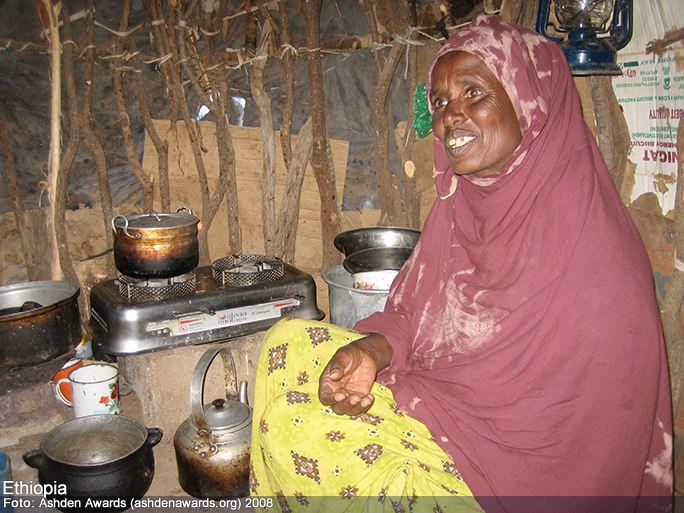
|
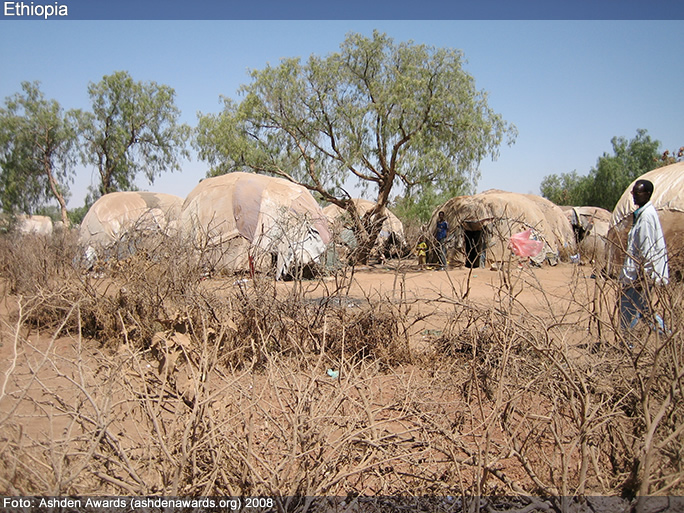 |
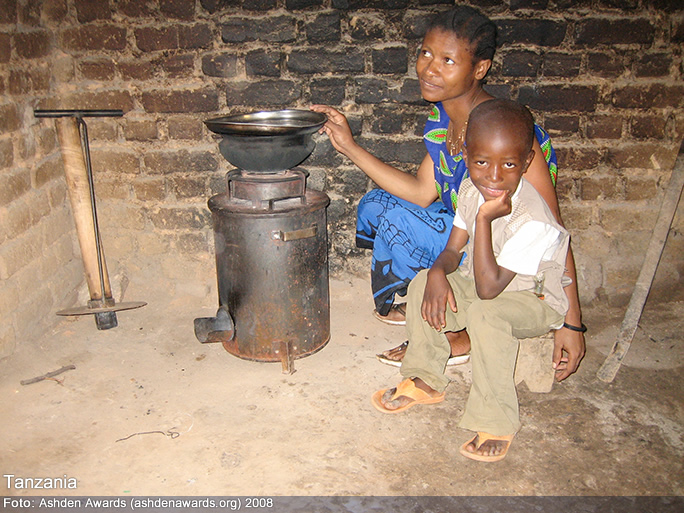 |
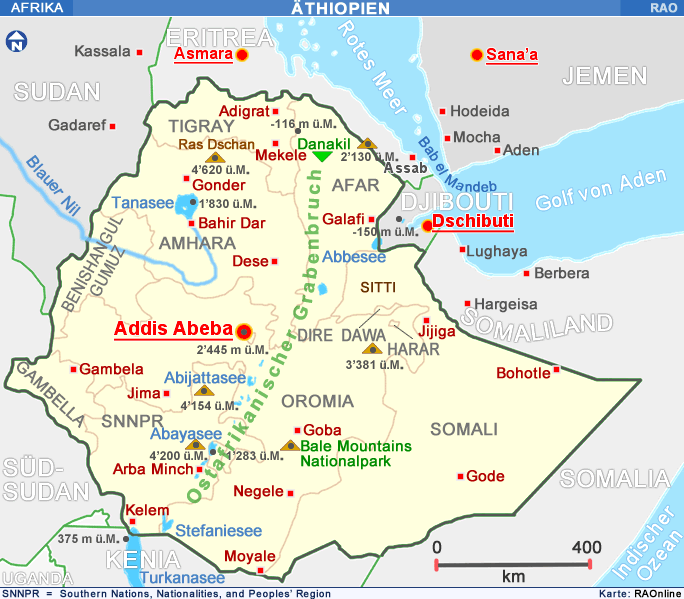 |
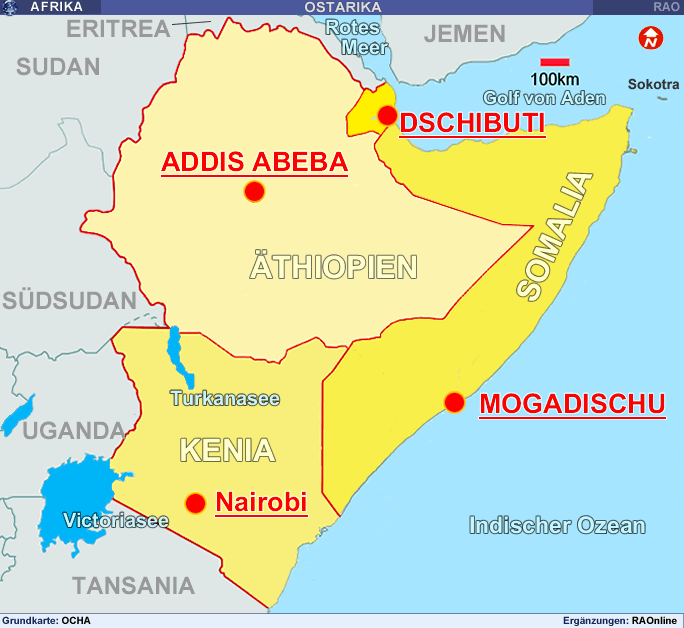 |
| Weitere Informationen |
|
| RAOnline: Weitere Informationen über Länder |
|
| Links |
| Externe Links |
|
 |
|
|
|